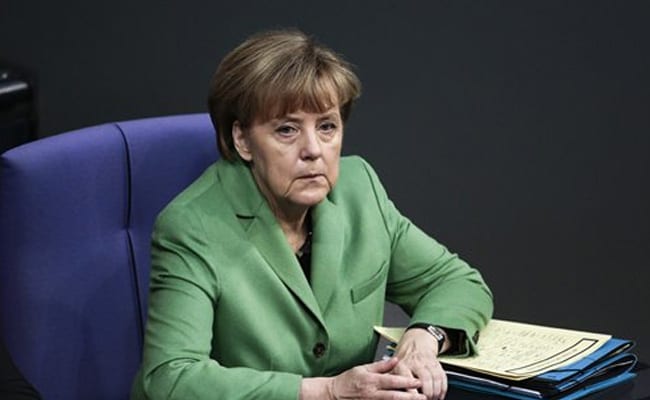
File Photo of Angela Merkel.
Berlin:
Chancellor Angela Merkel is hoping to send a robust message on climate change from a G7 summit this weekend but may be undermined by Germany's own heavy dependence on coal.
Europe's top economy sees itself as a pioneer among industrialised nations for its "energy transformation" pushing the development of renewables while phasing out nuclear power.
However the ambitious drive, prompted by Japan's Fukushima nuclear disaster in 2011, has extended its reliance on coal, particularly the country's own enormous lignite deposits.
Environmentalists aim to use the G7 huddle starting on Sunday at Bavaria's Elmau Castle to hold Merkel's feet to the fire over Germany's dirty and abundant coal-fired plants even as she seeks ambitious climate pledges from the club of rich nations.
Looking ahead to the summit, Greenpeace launched protests across Germany last weekend under the banner "Climate Chancellor or Coal Chancellor?" demanding that Merkel take a stand on a decisive issue in the climate debate.
Given its low price and a broken European system of carbon emissions trading, coal remains the primary source of electricity in Germany, accounting for 45 percent of gross production.
The issue has even torn at the fabric of her left-right "grand coalition" government between Merkel's conservatives and the Social Democrats.
Environment Minister Barbara Hendricks, a Social Democrat who is fighting for a reduction in coal use, summed up the paradox recently: "No country can enter into international climate talks credibly if it has failed to even reach its own targets."
Tobias Muenchmeyer of Greenpeace Germany agreed that if the chancellor wants to draw concessions from other countries, she must have her own house in order.
Merkel "will leave for Elmau weakened unless she ends the fight over coal," he said.
She will host the two-day meeting under the rotating G7 presidency with the leaders of Britain, Canada, France, Italy, Japan and the United States with reduction of dangerous greenhouse-gas emissions high on the agenda.
Europe's top economy sees itself as a pioneer among industrialised nations for its "energy transformation" pushing the development of renewables while phasing out nuclear power.
However the ambitious drive, prompted by Japan's Fukushima nuclear disaster in 2011, has extended its reliance on coal, particularly the country's own enormous lignite deposits.
Environmentalists aim to use the G7 huddle starting on Sunday at Bavaria's Elmau Castle to hold Merkel's feet to the fire over Germany's dirty and abundant coal-fired plants even as she seeks ambitious climate pledges from the club of rich nations.
Looking ahead to the summit, Greenpeace launched protests across Germany last weekend under the banner "Climate Chancellor or Coal Chancellor?" demanding that Merkel take a stand on a decisive issue in the climate debate.
Given its low price and a broken European system of carbon emissions trading, coal remains the primary source of electricity in Germany, accounting for 45 percent of gross production.
The issue has even torn at the fabric of her left-right "grand coalition" government between Merkel's conservatives and the Social Democrats.
Environment Minister Barbara Hendricks, a Social Democrat who is fighting for a reduction in coal use, summed up the paradox recently: "No country can enter into international climate talks credibly if it has failed to even reach its own targets."
Tobias Muenchmeyer of Greenpeace Germany agreed that if the chancellor wants to draw concessions from other countries, she must have her own house in order.
Merkel "will leave for Elmau weakened unless she ends the fight over coal," he said.
She will host the two-day meeting under the rotating G7 presidency with the leaders of Britain, Canada, France, Italy, Japan and the United States with reduction of dangerous greenhouse-gas emissions high on the agenda.
Track Latest News Live on NDTV.com and get news updates from India and around the world

